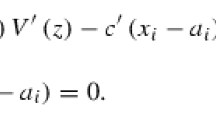Abstract
This paper shows that a policy that uniformly increases contestants’ effort costs can lead to an increase in total effort. In asymmetric settings, this “levels the playing field” and therefore encourages weaker players (who otherwise would have stayed out) to enter. Paradoxically, a contest designer whose only objective is to maximize total effort may thus wish to make rent-seeking “more difficult.” These results suggest that the often-lamented bureaucratic red tape might in fact be a rational response to the problem of attracting lobbyists to participate in a contest.
Similar content being viewed by others
References
Anderson, L., & Stafford, S. (2003). An experimental analysis of rent seeking under varying competitive conditions. Public Choice, 115, 199–216.
Appelbaum, E., & Katz, E. (1986). Rent seeking and entry. Economics Letters, 20, 207–212.
Baye, M., & Hoppe, H. (2003). The strategic equivalence of rent-seeking, innovation, and patent-race games. Games and Economic Behavior, 44, 217–226.
Bulow, J., & Klemperer, P. (1996). Auctions versus negotiations. American Economic Review, 86, 180–194.
Che, Y.-K., & Gale, I. (1998). Caps on political lobbying. American Economic Review, 88, 643–651.
Dasgupta, A., & Nti, K. (1998). Designing an optimal contest. European Journal of Political Economy, 14, 587–603.
Gradstein, M. (1995). Intensity of competition, entry and entry deterrence in rent seeking contests. Economics and Politics, 7, 79–91.
Gradstein, M., & Konrad, K. (1999). Orchestrating rent-seeking contests. Economic Journal, 109, 536–545.
Higgins, R., Shughart, W., & Tollison, R. (1985). Free entry and efficient rent seeking. Public Choice, 46, 247–258.
Hillman, A., & Riley, J. (1989). Politically contestable rents and transfers. Economics and Politics, 1, 17–39.
Krueger, A. (1974). The political economy of the rent-seeking society. American Economic Review, 64, 291–303.
Lockard, A. (2003). Decision by sortition: A means to reduce rent-seeking. Public Choice, 116, 435–451.
Matros, A. (2006). Rent-seeking with asymmetric valuations: Addition or deletion of a player. Public Choice, 129, 369–380.
Moldovanu, B., & Sela, A. (2001). The optimal allocation of prizes in contests. American Economic Review, 91, 542–558.
Nitzan, S. (1994). Modelling rent-seeking contests. European Journal of Political Economy, 10, 41–60.
Nownes, A. (2006). Total lobbying: What lobbyists want (and how they try to get it). Cambridge: Cambridge University Press.
Olson, M. (1971). The logic of collective action: Public goods and the theory of groups. Cambridge: Harvard University Press.
Posner, R. (1975). The social costs of monopoly and regulation. Journal of Political Economy, 83, 807–827.
Runkel, M. (2006). Optimal contest design, closeness and the contest success function. Public Choice, 129, 217–231.
Ryvkin, D. (2007). Contests of weakly heterogeneous players. Public Choice, 132, 49–64.
Stein, W. (2002). Asymmetric rent-seeking with more than two contestants. Public Choice, 113, 325–336.
Tullock, G. (1967). The welfare costs of tariffs, monopolies, and theft. Western Economic Journal, 5, 224–232.
Tullock, G. (1980). Efficient rent seeking. In J. Buchanan, R. Tollison, & G. Tullock (Eds.), Toward a theory of the rent-seeking society (pp. 97–112). College Station: Texas A&M University Press.
Wilson, J. (1989). Bureaucracy: What government agencies do and why they do it. New York: Basic Books.
Author information
Authors and Affiliations
Corresponding author
Rights and permissions
About this article
Cite this article
Ritz, R.A. Influencing rent-seeking contests. Public Choice 135, 291–300 (2008). https://doi.org/10.1007/s11127-007-9263-9
Received:
Accepted:
Published:
Issue Date:
DOI: https://doi.org/10.1007/s11127-007-9263-9




